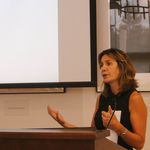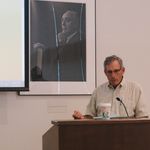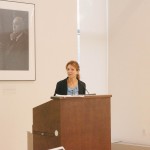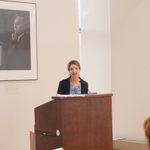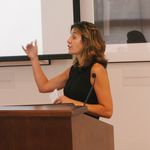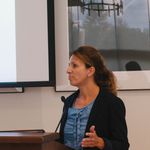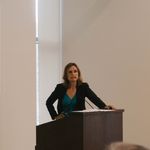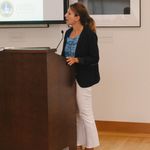Author: edamrien
Centre for the Study of European Contract Law “Birthday” Conference
EU Views: Barbara Boschetti
Name: Barbara Boschetti
Nationality: Italian
Occupation(s): Barbara Boschetti is a member of the Faculty of Political and Social Sciences and Associate Professor of Administrative Law at the Catholic University of Milan (Italy).
Date of interview: September 8, 2016
In this episode, Barbara Boschetti, Associate Professor of Administrative Law at the Catholic University of Milan (Italy), discusses the state of democracy in the EU, distinguishing procedural democracy from ballot box democracy. She shares her optimism regarding the future of the EU, even after Brexit, which she argues may in fact strengthen ongoing federalist processes.
EU Views: Vlad Perju
(Re-posted from EU Futures)
Name: Vlad Perju
Nationality: Romanian
Occupation(s): Director of the Clough Center for the Study of Constitutional Democracy at Boston College and Professor of Law at Boston College Law School; Research Fellow and Co-Chair of Harvard's CES’ EU Law Study Group; served as a member of Romania’s Presidential Commission on Constitutional Reform
Connection to Europe: European citizen; research interests centered upon European Union law, comparative constitutional law and theory, international and comparative law and jurisprudence; observer of constitutional developments and authoritarianism in Eastern Europe (particularly Romania)
Date of interview: May 25, 2016
This episode is a conversation with Vlad Perju, a Romanian Professor of Law at Boston College Law School, who identifies and addresses the two conflicting projects of European integration: one based upon fusion and unity, the other centered on cooperation and coordination of Member States. He talks about the challenge of European versus national law, and highlights some of the discontinuities in the goals of European integration, including the major issue of the continued existence of nation states without nationalism. Perju discusses how legal documents encapsulate the conflicting political project in the EU, and how the paradigm of the constitutionalization in Europe has two lenses (doctrinal and normative) which European lawyers must use in the reformation of European law in order to promote the active involvement of citizens in the European integration experiment.
EU Views: Marija Bartl
(Re-posted from EU Futures)
Name: Marija Bartl
Nationality: Dutch
Occupation(s): Lecturer in Law at the University of Amsterdam; Research Fellow at Boston University within the project “Architecture of Post-national Rulemaking.”
Connection to Europe: European citizen; interdisciplinary research agenda focused on the legitimacy of market integration beyond the state (focused on the EU); awarded competitive personal research funding ‘VENI’ from the Dutch Research Council (250 000EUR) for the project “Bringing Democracy to Markets: The TTIP and the Politics of Knowledge in Postnational Governance.”
Date of interview: May 17, 2016
This episode is a conversation with Marija Bartl, a Dutch Lecturer in Law at the University of Amsterdam, about the polarization of Member States in regards to economic policy, and the urgent need for solidarity within the European Union in the restructuring and formation of institutions to address the monetary and social crises facing Europe today. She points out the lack of true democracy in Europe, and emphasizes the necessary establishment of a public sphere where citizens can Europeanize issues, coordinate appropriate responses, and reconsider commitments to each other to join in an open discourse about the Common Market. Bartl also discusses the mobilization of Europeans, across political and national boundaries, against the proposed TTIP, and how public demonstrations represent the power citizens have when committed to the principles of solidarity in actively influencing policy making decisions at the European level.
EU Views: Sara Poli
(Re-posted from EU Futures)
Name: Sara Poli
Nationality: Italian
Occupation(s): Associate Professor of European Law and International Law, and Political Science at the University of
Pisa;
Connection to Europe: European citizen; Jean Monnet Chair (2013-2016) under the Lifelong Learning Programme on ‘Good governance principles within and outside the EU.’
Date of interview: May 17, 2016
This episode is a conversation with Sara Poli, an Italian Professor of European and International Law at the University of Pisa, about the uncertainty within the European Union today. She discusses the question of Member States retaining sovereign powers while simultaneously addressing the need for a common response to major security challenges caused by the migration crisis. Poli speaks on the volatility in the European periphery of the Middle East and Northern African, and the need for the EU to emphasize solidarity with one another and involve themselves in conflict resolution efforts in the Neighborhood.
EU-Views: Iris Goldner Lang
(Re-posted from EU Futures)
 Name: Iris Goldner Lang
Name: Iris Goldner Lang
Nationality: Croatian
Occupation(s): John Harvey Gregory Lecturer on World Organization at Harvard Law School (Winter 2016); Jean Monnet professor of European Union law and UNESCO Chair on Free Movement of People, Migration and Inter-Cultural Dialogue at the University of Zagreb, Faculty of Law; President of the Croatian Society for European Law (affiliate of FIDE)
Connection to Europe: European citizen; studies EU internal market law, free movement of persons in Europe, EU migration and asylum law, association agreements, EU institutional law, EU health law and policy; took part in accession negotiations between Croatia and the EU as a member of three working groups on workers, services and establishment and on institutions
Date of interview: May 10, 2016
This episode is a conversation with Iris Goldner Lang, a Jean Monnet professor of European Union law and UNESCO Chair on Free Movement of People, Migration, and Inter-Cultural Dialogue at the University of Zagreb, about the influence of the refugee crisis on European integration. Lang discusses the moral and legal obligations of the EU to properly handle the migrants attempting to enter Europe, and explains how European institutions can rely on mechanisms beyond the political sphere to solve the crisis. She describes the current trend of regressive integration, which has resulted in the closing of Europe and the restriction of rights and freedoms of both migrants and EU citizens.
The interview was conducted by Olya Yordanyan, EU Futures Project Coordinator. A transcript follows.
IGL: My name is Irish Goldner Lang. I’m a Professor of European Union Law at the University of Zagreb in Croatia, and I’m spending the academic year 2015-2016 in Cambridge, at Harvard Law School. I’m here as a Visiting Professor, and I’ve been teaching—together with another colleague from Zagreb—a course called Global Effects of European Union Law, which was taught in winter term at Harvard Law School. I’m also a Fulbright Fellow, so I’m doing research this year, and in summer 2016, I’ll be back in Zagreb at my regular job.
OY: What future is currently emerging in the European Union?
IGL: Well, I don’t know, it’s very difficult to predict considering all that’s going on in terms of all the ups and downs that Europe has been going through in the past several years. There are currently a lot of issues, a lot of challenges, that Europe has to respond to. So it’s very difficult to see what will come out of it. I hope it will end up for the better but it’s very difficult now and politically there are a number of misunderstandings and disputes in terms of how to deal with the current problems. So we’ll have to watch and see. But primarily I think that Europe will have to find some kind of response to the mass refugee inflows that it has encountered in the past months and years and also it will have to find a way to speak in a more united way.
OY: So what kind of response would be best in your view in terms of addressing the immigration crisis.
IGL: In terms of addressing the refugee crisis, I would definitely opt for—and I think that’s the only right solution—is for Europe to respond in a humanitarian, morally acceptable way, by actually enabling anybody whose life is threatened to find their home in Europe. This is a responsibility; it’s not only a moral but a legal responsibility, based on human rights standards, based on the Geneva Convention, the refugee convention, and based on European Union law. As you know there have been different problems in terms of what is the right solution, but I think that despite the fact that everyone is saying the Europe cannot accept so many refugees, I think that if you look in relative terms, in global terms, the numbers are not that huge. We are talking about more than a million refugees that entered Europe and applied for asylum in 2015, and that is true. But if you compare that number with the total number of inhabitants in Europe, it represents only 0.2 percent of European population, and I think that Europe should be able to accommodate this number of people. Now is this the solution to the crisis? No, because we can expect more and more people around the world to run away from their homes for different reasons: because of wars, because of climate changes, and so on. I think that both Europe and other developed countries have to respond to these needs in a more global and united way. Either by establishing some kind of resettlement quotas or something like that. But it’s not only that. I think that Europe has to find a way to improve its decision making process not only with respect to the refugee crisis but in general.
OY: What do you mean specifically.
IGL: Generally speaking the way the European Union works is that decisions are made, mostly, by the Council of Ministers, which is an EU institution where representatives of EU member states sit, and also by the European Parliament. Usually the proposal of a new legislative act is done by the European Commission. Now it’s very difficult to somehow influence the way different member states would like the decision making process to develop. Sometimes different member states have different interests; bigger member states usually have a stronger say. There are different interests and different ad hoc groups that are created based on those interests. So it’s very politicized, I would say. And I think that the European Commission, which is a kind of executive institution, which is there to propose certain measures, should have a stronger say. Because that’s the institution that represents the interests of the European Union and further European integration. So I think that the European Commission primarily has a responsibility to act in a stronger way without so much being influenced by different member states.
OY: You talked a little bit about integration but I would like to learn about your vision of the future of European integration. How do you see the future of European integration?
IGL: OK. There has been a lot of talk about Europe, actually, of dis-integration of Europe, due to all the crises that Europe has gone through in the past decade or so. I don’t think that Europe actually—at least not in the short and mid-term period—will disintegrate. I don’t think that this is going to happen. I really think that Europe is continuing its integration process, despite all the problems it’s facing. Now this integration process though might go in different directions. So we might have on the one hand different EU measures being adopted which will create a more introverted, more closed, Europe. And this is something we are facing now. There is this term, Fortress Europe, Europe becoming closed, and building walls at its external borders. And this is happening now because of the refugee inflows. And it’s not something that we want to see. This is not how we perceive Europe. Europe is not about walls. But it’s also a kind of a way of integration, which is happening at the moment. Further integration measures might go in the way of promoting free movement or restricting free movement. And we might have such measures in the future, not only due to the refugee inflows but also due to other developments, such as for example, the deal that has been struck between the European Union and the United Kingdom, which will be implemented in case of a positive vote in the UK referendum, in case the United Kingdom stays in the EU. So all these developments might influence the way that the European Union will integrate in the future. There are developments also which support the statement that Europe is integrating in different areas like banking union, the financial policies, and so on. So all these developments just testify that Europe is continuing its integration process, but it’s a different type of integration process in comparison to the one we have witnessed in the past several decades.
OY: How would you characterize this different kind of integration?
IGL: I would say it’s an integration towards a more closed Europe. It’s not a progressive integration but a kind of regressive integration, which is sort of restricting rights and freedoms.
OY: I would like to learn about your understanding of the role of democracy in terms of its impact on the future that is emerging in Europe.
IGL: Well I think definitely and this also is connected to the decision making process. Having democratic societies in Europe in all EU member states is crucial for further European developments. Because it is very important what is happening at national levels in different member states, in states like Hungary or the UK or France or anywhere else. Now the rise of different populist right wing movements that we have been witnessing in the past several years in Europe, that’s not a good sign. That’s not good either for those particular members states or for Europe in general. And these are the trends which are not going in favor of either of EU integration or any type of development of democratic societies. What should we do about it? Well, I think each one of us has a responsibility, as just an ordinary citizen, to react, to be involved, to participate, to help in terms of promoting certain principles and values that the EU is based on. Either by helping who are in need, like asylum seekers, or anybody else. So I think that we need to work on that. I think that EU institutions also have a role and a responsibility to act, and to react, to certain developments in countries like Hungary, Poland, and so on. And they shouldn’t stay quiet. So we’ll see how it’s going to go.
OY: What kind of reaction are you expecting?
IGL: Apart from the political pressure that can be put on certain member states, in case if statements or legal developments that go contrary to EU principles and values, apart from those political reactions, there are also legal reactions that can take place. One legal mechanism which is quite useful and which has been used in practice for many years is the so-called infringement procedure. So in the case you have an EU member state that does not respect EU law—so it fails to fulfill its EU law obligations—the EU Commission can start proceedings against that member state, which can end up with the judgment of the Court of Justice in Luxembourg. Which can proclaim that that member state should pay a penalty payment or a lump sum. There is another mechanism, which has never been used so far, it’s based on Article 7 of the treaty on the European Union, which basically enables the EU institutions and other member states to limit, or block, membership rights of a particular member state which has done something against EU values and principles. This mechanism has never been used. It’s very questionable whether it will ever be used because it requires unanimity of all the member states in order to activate this mechanism in the Council of Ministers, which is quite unfortunate because it is very difficult to have all the other member states going against a particular member state that might be doing something contrary to EU values, like, for example, Poland or Hungary are doing or are potentially doing. So there are now thoughts in the European Commission and elsewhere that this mechanism should be changed in order to make it possible to use it in practice. Because currently it’s just not possible. So we’ll see. I think that these mechanisms should be employed. So if you see the political mechanisms are not working, legal mechanisms should be employed to do something, and to warn those states that Europe is not about closing borders and building walls and barbed fences and giving some very homophobic statements and so on which go contrary to human dignity and democracy, but Europe is something else.
OY: You talked about the rise of nationalism and right wing parties across the European Union. How do you think this will affect EU governance and possibilities of European politicians coming together about immigration issues, security, terrorism, and such.
IGL: Definitely the rise of such tendencies do influence EU-level policies and politics. It’s unavoidable. Even if we talk about political parties that are currently not in power in certain member states. But then of course those who are in power might be influenced by them. So it does play a huge role. I think that also civil society, NGOs, have an important role in building respect among people. I also think that, based on the previous experience (not too good experience) of how Europe has managed to integrate people who are coming to different countries, that Europe needs to work on that as well. If you look at how different member states have in the past decades managed or not managed to integrate newcomers onto their territories, they haven’t done a good job. Now there is this fear—with good reason, I would say—that one million or more asylum seekers that have reached the European territory in 2015 will be properly integrated, which is important both in terms of their wellbeing and the wellbeing of Europe. Because Europe has certain values and principles of democracy and human dignity and so on, and you want those principles to stay in tact. You don’t want whoever comes to change the society in such a way as to delete those principles.
OY: If you were to think about the Europe we have today, and the problems Europe is facing, and to think of Europe ten years later, what kind of Europe do you see?
IGL: I don’t know, because I like to be an optimist, which is quite difficult at this time. I have a feeling that the way Europe is currently developing is very different in comparison to what its development had been in the twentieth century and it’s not for better. So I would like to see Europe in ten years time going on its previous track of promoting peace and stability, and not only economic development of all its member states. Of course economic development and wellbeing is very important, but peace and stability is equally important. And after all this is primarily why Europe and European integration had started sixty years ago. So I hope Europe will go in that direction. I am quite confident that if European integration had not happened sixty years ago, Europe would have gone through many more wars than it has. The development of European integration has actually prevented wars, and I think that people, no matter how old they are, tend to forget this, and tend to underestimate this crucial role of the European Union.
OY: Can the European Union continue acting as a soft power as it has in past years given all the changes in the international community that have happened?
IGL: We’ll see. But the thing is that the European Union, due to the way it’s structured, very much relies and depends on its member states. It’s not like the United States, which has its own army, which has its own border controls and so on. The European Union does not have that. In order to become a different type of power, you would need that change, which is currently not taking place. Whether we are going to see that, maybe, who knows? There are proposals currently on the table that the European Union should have some kind of a pan-European border force, which is one of the reactions to the refugee inflows. Member states are reluctant to have that. They don’t like the idea of having somebody else control their external borders towards third countries. So even this proposal, which is currently on the table, I don’t expect will be accepted, at least in the short term, so who knows?
OY: Is there anything I didn’t ask you about but that you want to talk about?
IGL: No, I think that’s basically it, but I would just like to emphasize that I really do think that there is a responsibility, on each one of us, as an ordinary citizen, no matter whether you are specialized in European Union issues, or working in a completely different field, no matter how old you are, to contribute to positive developments in the European Union. I think we have an obligation to participate, and to contribute to civic engagement.
Event Announcement: Administrative Agencies and Regulatory Styles: EU-US Comparisons and Current Issues (09.09.16)
Event Announcement: Il Diritto Privato Europeo Realtà e Prospettive
Event Highlights: Critical Perspectives on the Law, Economics, and Politics of the EU’s Agreements with African States
On Tuesday, May 17, Daniela Caruso convened a workshop on the law, economics, and politics of the EU's Agreements with African states. The aim of the workshop was to shed light on recent developments in the trade and/or cooperation agreements between the north and south of the Mediterranean basin. The main focus is on the law and political economy of EU agreements with African countries, beginning with partnerships enshrined in the European Neighborhood Policy and then proceeding with EU arrangements with sub-Saharan states.
The workshop began with book presentations by Sara Poli, Associate Professor and Jean Monnet Chair of European Union law at the University of Pisa, Italy, and Mark Langan, Lecturer in International Politics at the University of Leicester, UK. Poli discussed her edited volume, The European Neighborhood Policy - Values and Principles (Routledge 2016), a legal analysis of the values and principles that form the basis for the European Neighbourhood Policy. Langan discussed his recent book, The Moral Economy of EU Association with Africa (Routledge 2015), on the impact of Africa-Europe trade and development co-operation on citizens in developing countries.
Prof. Kevin Gallagher (BU) led the discussion, offering insights on the evolutions of trade and development strategies in the Global South, while Prof. Daniela Caruso shared perspectives on “Trade and History,” based on co-authored work with Joanna Geneve on Algeria-EU relations. A lively conversation followed the presentations.
Created with flickr slideshow.

